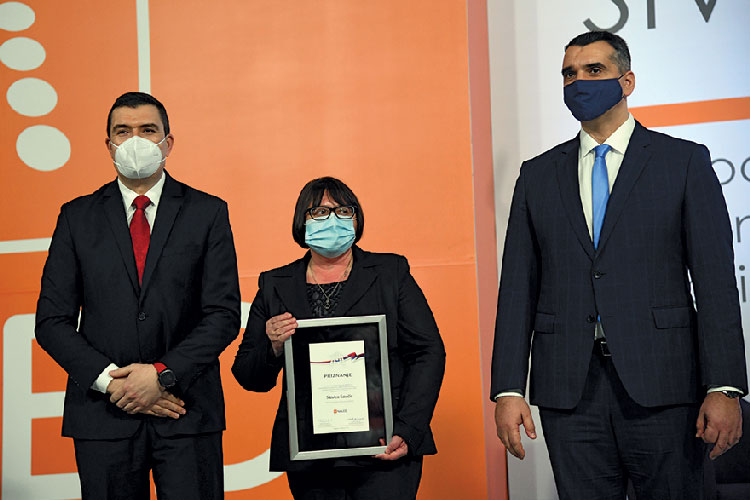I think we have managed to alleviate the consequences of the pandemic and to save our economy and employment, but also the health and lives of our people. I am proud to have been part of the economic crisis headquarters of the Government of Serbia
Slavica Savičić, State Secretary at the Ministry of Finance, is the winner of NALED’s annual recognition for an outstanding contribution to improving the regulatory framework for business and economic measures to support the economy during Covid-19. She also played an important role in carrying out some of NALED’s key recommendations to combat the grey economy, including preparing a legal framework for digital fiscalization and electronic invoicing.
What was your role in preparing the aid package to preserve the economy and jobs?
Last year was very challenging for the Ministry of Finance, as we faced a serious health and economic crisis full of unknowns. I think that at that time, when we knew little about what awaited us, we did everything very quickly and efficiently to allay the consequences of the coronavirus pandemic. I can now see that as part of the economic crisis headquarters I had the opportunity to participate in a process of rapid and efficient decisions that preserved the vitality of the Serbian economy, the health of our people and employment.
My role was to formalize all the decisions, to prepare a legal framework with my colleagues on the basis of the measures to be implemented. A further challenge was designing procedures to implement the measures. I must point out that throughout the pandemic, we have had very good cooperation between all ministries, so we worked together on all assistance measures, both generally and by sector. Furthermore, during the pandemic the government and all institutions were absolutely committed to a successful adoption of all the measures. The biggest challenge was devising how to ensure that all the measures were carried out quickly and efficiently, so that the burden on companies and the public was as light as possible, but also so that aid beneficiaries were less exposed to epidemiological risks.

You have also made a great contribution to enforcing the measures of the National Program for the Suppression of the Grey Economy – what are the results?
Besides crisis measures, the Ministry of Finance was committed to other aspects of improving the economic framework, so we also worked on important laws passed at the end of the year, the Law on Fiscalization and the Law on Digital Property. The Law on Electronic Invoicing is currently passing through the National Assembly. Also, the prize game ‘Take the Bill and Win’ had a full effect, because we received over 11 million envelopes. Everything the Ministry of Finance does is aimed at providing the best possible conditions for the functioning and competitiveness of our industry. The fact that we have implemented more than 70% of measures from the National Programme for Suppression of the Grey Economy shows how committed the Ministry of Finance is to creating conditions for fair competition.
You worked with NALED on these activities and reforms. How would you rate your cooperation?
I think we had a completely open and constructive relationship over the three years we have worked together. I appreciate the commitment of my colleagues at NALED. I think NALED’s activities and the open approach of its professionals contribute to everything that affects the efficiency of the system, allowing the boundaries to be moved every year with an increasing number of resolved recommendations for better business conditions.
I appreciate the commitment of my colleagues at NALED. I think NALED’s activities and the open approach of its professionals contribute to pushing the boundaries every year with an increasing number of resolved recommendations for better business conditions
Among the 100 recommendations of the Grey Book, most are always related to the Ministry of Finance. Does that worry or inspire you?
For the Ministry and the Minister of Finance, any new proposal that can improve the business environment and help industry is a challenge to find the best solutions and be practical enough to make use of any good recommendation. I think the greatest challenge this year will be to implement the recommendation to establish a single system of electronic invoicing to bring greater transparency of transactions and predictability and security of payments.
Looking at the priorities of industry, the Grey Book highlights proposals for reducing payroll deductions, establishing a public electronic register of non-tax charges, introducing a unified tax certificate and enabling non-cash payment of fees without submitting proof of payment. What progress can we expect on these recommendations?
The Ministry of Finance will be fully committed to all proposals. Due to the pandemic, this year will be difficult too, there will be a lot of challenges, both in preparing and implementing each recommendation. In that sense, analysis, work and preparation await us, to establish the conditions for their execution.
And finally – what new things are you preparing for us in the Ministry of Finance?
Adopting the Law on Electronic Invoicing is currently underway, beginning the roll out of one of the Grey Book’s recommendations. It remains for us to prepare the other elements necessary to implement this law, such as the necessary regulations and a functional platform to exchange and register electronic invoices.
We are also preparing the necessary technical elements to enable the full implementation of the Law on Fiscalization from 1 January 2022. The novelty that will make people happy is that this year we will organize two more rounds of the Take the Bill and Win game, now during May and in the autumn.